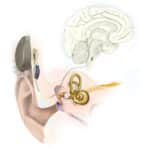


A cochlear implant activation can be one of the most surprising or emotional moments in the hearing journey. Of course activations are different for everyone, but that’s also what can makes them so special: everybody reacts in their own unique way. We love hearing about our recipients’ activation stories, and watching cochlear implant activation videos is

As we’ve talked about earlier, it’s really important to educate others about cochlear implants. But if it’s your child who has received, or will receive, a cochlear implant these “others” might be right within your own family: your child’s siblings. Of course we know that this can be a challenging time for you, so here’s

Editor’s note: this is the fourth in a series of guest articles shared by MED-EL recipient Morgan Martins. In her previous post, she received her first pair of hearing aids. Here, she shares what it’s like to be using hearing aids. The first 3 months of my new life with hearing aids were, I would say, okay. I was

Here’s a guest article from MED-EL cochlear implant recipient Robert Grey where he talks about what it was like to lose his hearing and receive a CI. Robert, who lives in the United Kingdom, lost his hearing after contracting meningitis at age 13. Meningitis Here I am, 32 years after contracting meningitis at the age of

Today, we’re really proud to announce the new SYNCHRONY Cochlear Implant System*. SYNCHRONY is MED-EL’s newest and most advanced cochlear implant system. The SYNCHRONY CI System features the water-resistant SONNET Audio Processor, RONDO, the only single-unit audio processor, and the SYNCHRONY Cochlear Implant so that you can enjoy hearing each and every moment. The SONNET